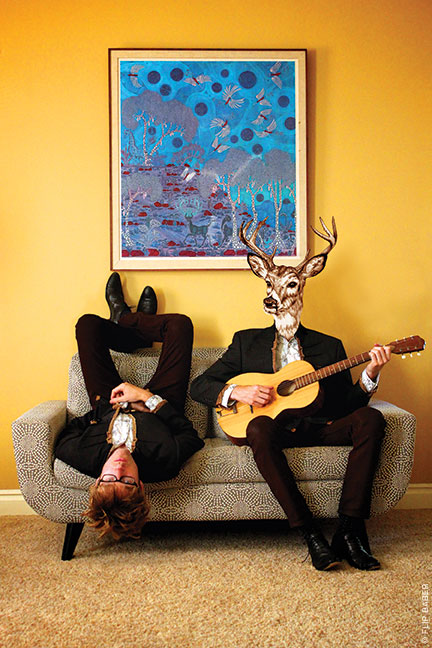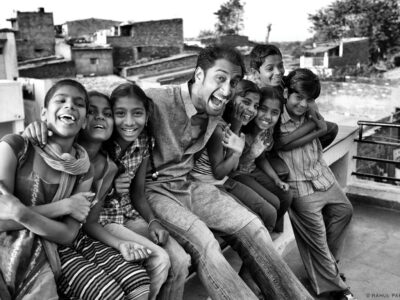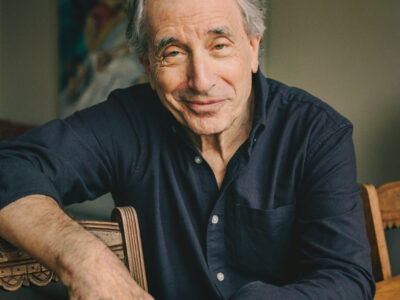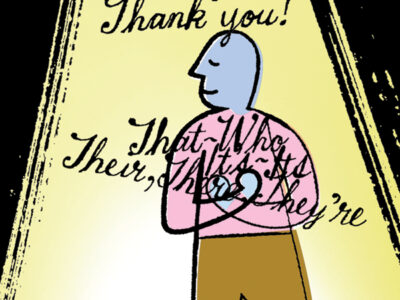
Class of ’95 | When we spoke with Nyles Lannon C’95 last spring, he had just released his third album, Falling Inside. Like his other albums, solo and with bands like Film School, it has received its share of critical praise. It also hasn’t sold much. The fragmented market and the emergence of Spotify and other Web-streaming outfits have been sucking the life out of album sales—and from opportunities to make a living through music.
As a husband and father of two young children, Lannon hasn’t been in any hurry to leave his Marin County home and studio and go touring. Yet he has managed to survive and even thrive as a musician: mostly by composing the music that ends up in commercials for companies ranging from Home Depot to Sprint to Adidas to Hyundai, as well as for various indie films and TV shows like Cold Case.
“I think of it like a modern-day Tin Pan Alley thing—grinding out music, not being precious about it, just bam-bam-bam,” he says. “I’m doing country music one day, zydeco the next, wailing guitar riffs the next. I basically churn out crazy amounts of songs in all kinds of genres and find homes for them in TV, movies, corporate videos, radio, internet ads, stadiums—anywhere I can possibly license my music.”
Lannon traces a lot of his versatility and success to the vibrant music scene at and around Penn in the early 1990s—starting when he first visited the campus as a high-school senior from the Bay Area and ended up at a Pi Lambda Phi Happy Hour. The blasting music and mish-mosh of “arty-types-meet-nerdy-types—this total group of misfits and people you wouldn’t expect”—knocked his socks off.
“There was a great music community—not only at Penn but all over West Philly,” he says. “People would organize shows almost every weekend and were very, very enthusiastic.”
His own enthusiasm for that scene is still palpable, even over the phone. His freshman roommate on the 13th floor of Arts House (aka High Rise East/Harnwell) was Kwame Johnson C’95, a “music fanatic who introduced me to tons of music,” he says. “I’m from the West Coast, and didn’t know any of the bands he was talking about: Fugazi, the Pixies, My Bloody Valentine, bands on Dischord Records, Touch and Go Records. My mind was exploding with all that stuff.”
A couple of years later the pair started a band, Splendorbin, with Johnson and Bill Elliot W’95 on guitar, Jason McKibben C’95 on drums, and Lannon on bass. He describes their sound as “really angular, mathematical music, kind of like Fugazi, very guitar-oriented, building songs around these guitar lines that are kind of interweaving with each other. It was very thought-out and purposeful and geometric—a lot of pointed lines and textures and dynamics and energy, not just strumming nice harmonies.
“It’s a music that’s born out of a post-punk sound,” he says, “and most of that influence was Kwame. It was new to me so it was exciting. I loved being the force, the glue. With bass, you’re kind of jelling everything together—playing a bedrock groove, but also interpreting the guitars.” Through trial and error, they weeded out the stuff that wasn’t working and expanded on what was. “Because of the support we got,” he says, “we got better and better, and just kept banging away at it.”
Pi Lambda and its fired-up music scene continued to be a draw throughout Lannon’s time at Penn. “We were exposed to all these great bands,” he says. “They would also have this insane spring festival—the Human Barbeque, which I seem to remember was 72 straight hours of music”—and by senior year Splendorbin was the BBQ headliner.
Their audience expanded, first to rock clubs around the Philadelphia area, then to New York, Baltimore, and Washington. The year after they all graduated they recorded an album, Stealth,with producer Steve Albini, but the band soon “splintered,” and Lannon moved back to the Bay Area. There, as N. Lannon, he put out a solo album titled Chemical Friends, which earned him a “Best Album of the Year” nod from the San Francisco Bay Guardian and a “Best Folktronica Artist” (whatever that means) from SF Weekly. The album, he says, sold “moderately well for an unknown artist.”
He then went back to school—Film School, an indie Bay Area band that lasted about five years and resulted in an album put out by Beggars Banquet. (One of his bandmates was Greg Bertens, aka Krayg Burton, who later collaborated with Lannon on an electronic pop project called Sacred Caves.) Film School enjoyed some modest success, but by the time his son was born in 2008, Lannon had had enough of bands and touring, and finally quit.
“I was just kind of flopping around” professionally, he says, trying to figure out how to make his musical experience pay the bills. Then he got a “random phone call out of the blue” from the creative director at an agency that did music commercials.
“He asked if I would work on this commercial spot, said he’d send me a video, and asked if I would try to write something for it,” Lannon recalls. “I was like, ‘How does this work?’ It was all new to me, but he showed me the ropes, the [computer] program you need. It’s all technical bullshit. There’s a total formula to commercials.”
Then another agency called. Pretty soon he was cranking out tunes as fast as the market could use them.
“I just grabbed it, got my foot in the door, and poured everything I could into it,” he says. That led to more agencies and more work, and forays into the world of licensing.
“I work with as many people as I can to write as many commercials as I can,” he says. “It’s fun, though it can be stressful sometimes. Deadlines for commercials are really tight, and you can’t wait for inspiration to strike. At the same time, I’ve got my own studio at home, so I can play music and do what I want to do. My relationship to music is different. It kind of affects the album stuff. It’s a lot harder to get into that frame of mind now, making a song that’s relevant to my emotional life.”
But life has a few tricks up its sleeve, and the nature of relevance is, well, relative. When we checked in with him again in October, Lannon told us that Film School had put on a reunion show—and that the band is back together. Now they’re writing new songs and have more shows lined up.
“Funny how time heals everything,” he says. “Everyone has kids now, and it’s just a different world.” —S.H.




